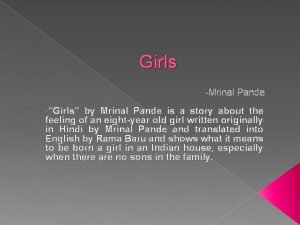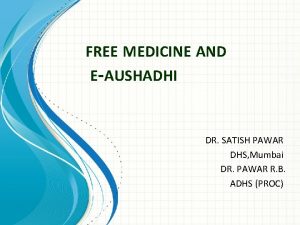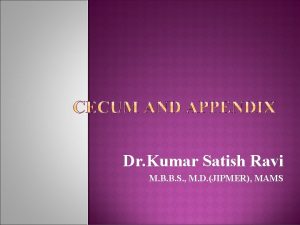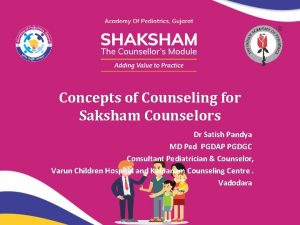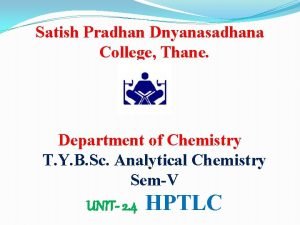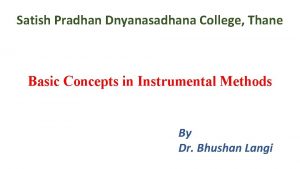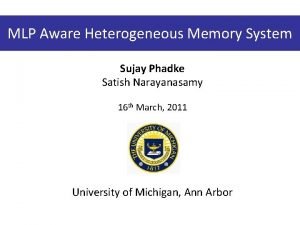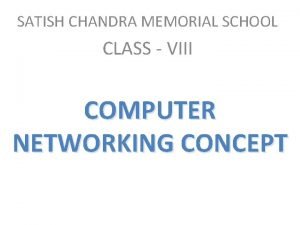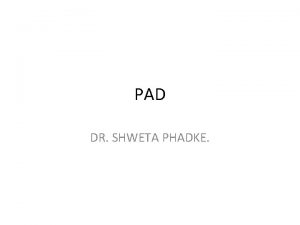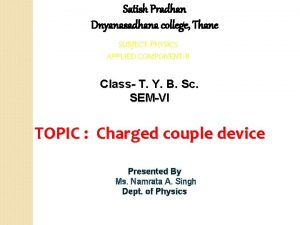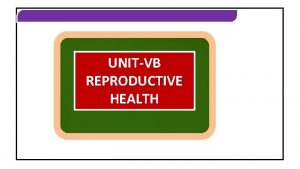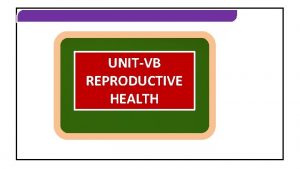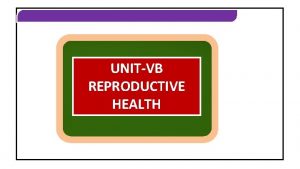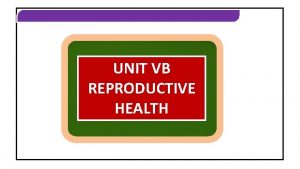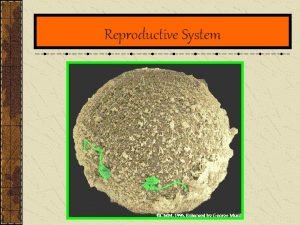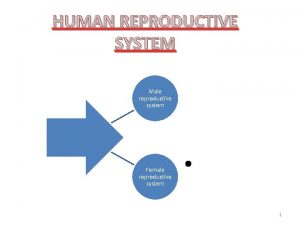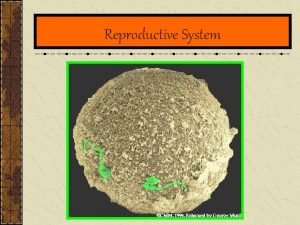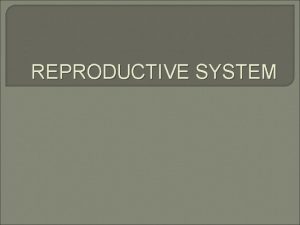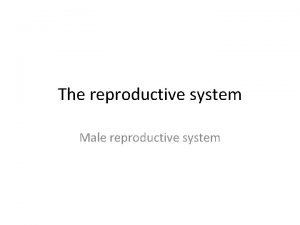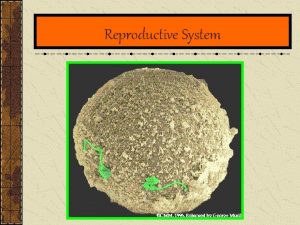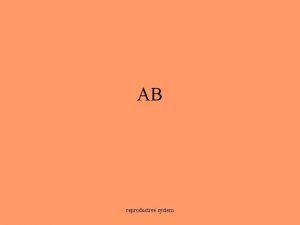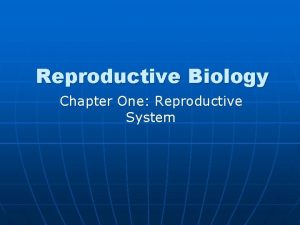Reproductive Health Rights Prof Dr Mrinal Satish Professor



















- Slides: 19

Reproductive Health Rights Prof (Dr. ) Mrinal Satish, Professor of Law & Executive Director, Centre for Constitutional Law, Policy, and Governance National Law University, Delhi

Backgr 0 und �Work in collaboration with DHCLSC in Tihar Jail, including in the Women’s Prison �Appointed to assist the High Court of Delhi in WP (Criminal) 1352/2015, High Court on its Own Motion v. State of NCT of Delhi �Commissioned by the MWCD to compile nation and international norms pertaining to women in detention and identify gaps

Major Issues Identified �Lack of information relating to cases �Issue of access to lawyers – Male lawyers unwilling to speak to women �Bail � Attitude of Families � On being granted bail: Sureties, Address verification �Sexual and Reproductive Health Rights

Sexual and Reproductive Health Rights �Spate of cases reaching courts (especially the Supreme Court) where termination of pregnancy sought post the 20 week statutorily limit in the Medical Termination of Pregnancy Act, 1971. �Reasons for the post-20 week cases, especially in the custodial context � Misunderstanding the MTP Act � Process and procedures of jails and of doctors

The Medical Termination of Pregnancy Act, 1971 �Section 3: � Pregnancy may be terminated if one registered medical practitioner (if pregnancy <12 weeks) and two registered medical practitioners (if pregnancy <20 weeks) of the opinion in good faith that: �Continuance of pregnancy would involve a risk to the life of the pregnant women or of grave injury to her physical or mental health Pregnancy from rape presumed to cause “grave injury” Failure of contraception in married couple and consequent unwanted pregnancy presumed to cause “grave injury” �There is substantial risk that if the child were to be born it will suffer from serious abnormalities.

MTP Act, 1971 �Section 3(4)(b): Consent of the woman required before terminating the pregnancy, except when under 18, where consent of guardian required. �Section 5(1): Section 3(2) on duration of pregnancy etc. , does not apply if termination of pregnancy is immediately necessary to save the life of the woman. �Hence, although MTP not on demand, the woman is the primary decision maker.

Confusion in Courts � Hallo Bi v. State of Madhya Pradesh, 2013 Cri. L. J. 2868 (MP) � Writ Petition filed by woman UTP seeking directions to state for termination of pregnancy � Allegation that pregnancy due to forced prostitution (hence, rape) � Originally, jail authorities forwarded application to CJM, who rejected the application � HC directed termination. Cites Suchita Srivastava v. Chandigarh Administration, (2009) 9 SCC 1 – Woman’s right to make reproductive choices also a dimension of Art. 21. Can be used by a woman to procreate or abstain from procreating. � Broader point: Judicial authorization not required under MTP Act. Curtails access.

Bombay HC Guidelines �High Court on its Own Motion v. State of Maharashtra, 2017 Cri. L. J. 218 (Bom) � Pregnant women constitute a category of persons. Incarceration does not remove a woman from that category � All pregnant women have a right to reproductive choices (under Art. 21), which includes right to terminate the pregnancy.

Bombay HC Guidelines (contd. ) �High Court on its Own Motion v. State of Maharashtra, 2017 Cri. L. J. 218 (Bom) � All women of reproductive age should be administered UPT on entry into prison (and within 5 days of such entry). If negative, to be repeated a month later. � If found pregnant, option to terminate pregnancy and the MTP Act should be informed. � If the woman signifies her wish to terminate pregnancy, should be immediately referred to hospital and all requisite support to be given

Special Provisions for Pregnant Women Prisoners �R. D. Upadhyay v. State of Andhra Pradesh, (2007) 15 SCC 337 – Guidelines Issued � To be ensured that prisons has all the required facilities for child-birth, ante and post-natal facilities � On finding pregnancy, reference to be made to government hospital � As fare as possible, delivery should be outside prison. Courts may release on bail/parole � Birth in prison to be registered, without noting that the child was born in prison

Reproductive Rights: Emerging Case Law � Conjugal Visits � Rama Murthy v. State, (1997) 2 SCC 642: Denial of conjugal life during period of incarceration leads to emotional trauma. � Jasvir Singh v. State of Punjab, 2015 Cri. L. J. 2282 (P&H): Prisoners have the right to conjugal visits with their spouses. Right to procreation and to conjugal visits is an element of right to dignity, guaranteed by Article 21 of the Constitution. � ART Procedures � Meharaj v. The State, 2018 SCCOn. Line Mad 278: Wife has right to procreate, which is not extinguished by her spouse being imprisoned. She has legitimate expectation to have a child, which cannot be denied.

Women’s Sexual and Reproductive Health Needs: Current Scenario �Women’s sexual and reproductive health needs often neglected in prisons �Insufficient provisioning of sanitary napkins and items for personal hygiene is a common complaint and finding in many studies on women’s prisons. �Access to specialized medical care often absent �Many prisons don’t have policies on post-natal care (which includes care after recent abortions, miscarriages or deliveries)

International Norms �WHO defines “women’s health” as a state of “complete mental, physical, spiritual and social wellbeing for all female infants, girls and women, regardless of age, socio-economic class, race, ethnicity and geographical location. ” �States’ obligations to secure right to health include providing health care that is Available, Accessible, Acceptable and of Good Quality (AAAQ Framework)

International Norms � Rule 10(1), UN Bangkok Rules: � Women Prisoners to be provided with suitable health care, which is atleast equivalent to those available to women in the general community. Reiterated by the Supreme Court in In Re Inhuman Conditions in 1382 Prisons, (2016) 10 SCC 17. � Rule 6, UN Bangkok Rules: � On admission, comprehensive health screening to be done; reproductive health history and issues to be determined. � UN Special Rapporteur on Health � States should take action to address access to sexual and reproductive health needs.

International Norms �Rule 8, UN Bangkok Rules � States to ensure medical confidentiality; Consent essential before any procedure relating to reproductive health history. �Rule 5, UN Bangkok Rules & Rule 18, Nelson Mandela Rules � Women to be provided sanitary napkins. �Rule 18, Bangkok Rules � Interpreted by UNODC to mean that contraception to be available on an equal basis as in the community, since contraceptive pills are used not only to prevent pregnancy, but to treat other gender specific conditions.

International Norms �Art 25(2), UDHR � Motherhood entitled to special care and assistance. �Article 12(2), CEDAW � Women to have access to appropriate services in connection with pregnancy, confinement and postnatal period. �Rule 48(3), Bangkok Rules � Pregnant and lactating prisoners to be provided with adequate, timely and free food, healthy environment and regular exercise opportunities.

International Norms �Rule 24, UN Bangkok Rules � No shackling of women pregnant women �Rule 2(2), UN Bangkok Rules � As far as possible, courts should give pregnant women and women with dependant children non-custodial sentences. �Law Commission of India, 135 th Report on “Women in Custody” � Sentences should be suspended during pregnancy and for a specified period after delivery/termination.

International Norms �Rule 28, Nelson Mandela Rules � As far as possible, delivery to take place outside the prison. In India, SC in R. D. Upadhyay had already held so. � If child born in prison, the fact not to be mentioned in birth certificate. In India, SC in R. D. Upadhyay; Mulla Committee �Rule 27, UN Bangkok Rules � If conjugal visits allowed, then on an equal basis for men and women. �Ruke

Recommendations in CLPG Report �Prisons should suo moto send information about pregnancy to the court where the woman’s case is pending. �Pregnant women to be informed about access to abortion under the MTP Act. �If a woman requests MTP, it should be performed as per the MTP Act, without unnecessary delays and requirement of judicial authorization.
 Mrinal dasgupta
Mrinal dasgupta Girls by mrinal pande
Girls by mrinal pande Promotion from assistant to associate professor
Promotion from assistant to associate professor Satish pradhan
Satish pradhan Determinate and indeterminate errors
Determinate and indeterminate errors Satish nune
Satish nune Eaushadhi maharashtra
Eaushadhi maharashtra Kumar satish ravi
Kumar satish ravi Dr satish pandya
Dr satish pandya Satish pradhan dnyanasadhana college online form
Satish pradhan dnyanasadhana college online form Satish pradhan dnyanasadhana college
Satish pradhan dnyanasadhana college Satish chalasani
Satish chalasani Sujay phadke
Sujay phadke Meena patel life of pi
Meena patel life of pi Synerzip
Synerzip Satish mallya
Satish mallya Satish malireddi
Satish malireddi Satish chandra memorial school
Satish chandra memorial school Pad claudication
Pad claudication Satish pradhan college
Satish pradhan college

